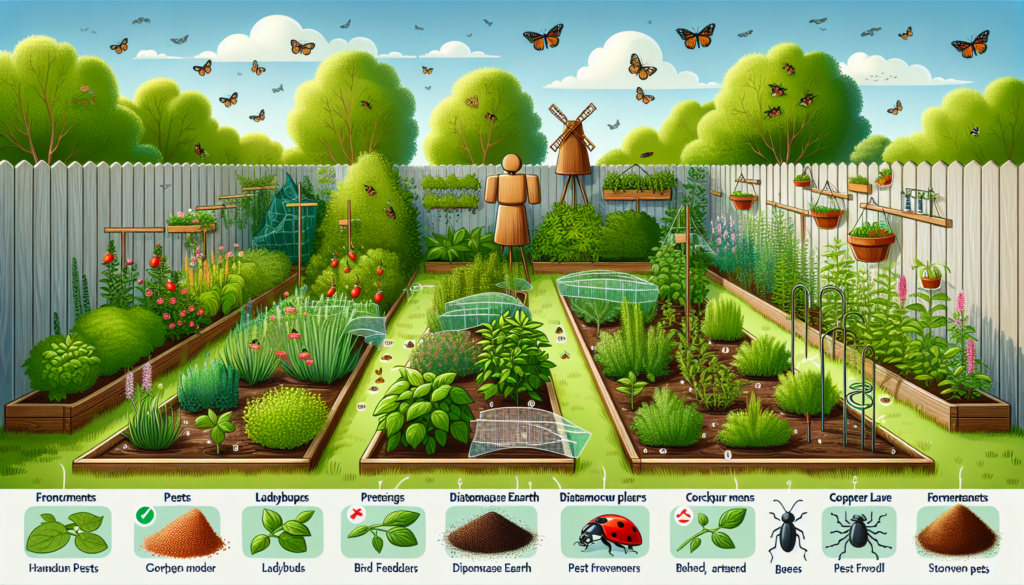So you’ve planted a beautiful herb garden and are excited to start using those fresh herbs in your cooking. But now you’re faced with the question: how do I keep bugs out of my herb garden? Nothing is more frustrating than spending time and effort on nurturing your plants, only to have them infested by tiny pests. Luckily, there are several simple and effective methods you can employ to keep those bugs at bay and ensure your herb garden stays healthy and thriving. Let’s explore some of the best strategies for bug-proofing your garden and enjoying the bountiful harvest of your herbs.

Choose the right location
When it comes to having a successful and pest-free herb garden, choosing the right location is crucial. Two important factors to consider are sunlight and drainage. Most herbs require at least six hours of direct sunlight each day, so it’s essential to select a spot in your garden that receives adequate sunlight. Additionally, herbs prefer well-drained soil, so avoid areas that tend to hold excess water or become waterlogged.
Another factor to keep in mind when selecting a location for your herb garden is the plants nearby. Some plants can attract pests that might harm your herbs. Avoid placing your herbs near plants that are known to attract pests like aphids, such as roses or certain fruit trees. By keeping your herb garden away from such pest-attracting plants, you can minimize the risk of infestations.
Creating physical barriers around your herb garden is a simple yet effective way to keep pests at bay. Installing fences or cages around your garden can prevent larger pests like rabbits or deer from nibbling on your herbs. Additionally, placing a barrier of fine mesh or row covers over your plants can shield them from smaller insects, such as aphids or caterpillars.
Plant pest-resistant herbs
Selecting herbs that are known to repel insects can help to naturally deter pests from invading your garden. Some commonly grown herbs with pest-repelling properties include basil, mint, lavender, rosemary, and thyme. Each of these herbs has natural oils and scents that insects find unpleasant, making them less likely to infest your garden. By including these herbs in your garden, you not only benefit from their culinary uses but also create a natural defense against pests.
Grouping plants with similar pest resistance together is a strategic way to protect your herbs. By planting herbs with similar pest-repelling properties next to each other, you can enhance their combined effect and increase the chances of deterring pests. This practice also helps minimize the spread of pests throughout your garden, as they are more likely to stay confined to one area.
Rotating your herbs seasonally is another useful practice to prevent the buildup of pests. Insect pests can adapt to specific plants and might develop resistance over time. By rotating your herb varieties each year, pests will have a harder time establishing themselves in your garden. This approach also helps maintain the overall health of your soil and reduces the risk of nutrient depletion.
Practice good gardening hygiene
Maintaining good gardening hygiene is essential for a healthy and pest-free herb garden. One crucial aspect is removing dead or diseased plant material promptly. This includes pruning dead leaves or stems and removing any plants that show signs of disease or infestation. By eliminating these potential breeding grounds for pests and diseases, you can prevent them from spreading and infesting other herbs.
Regularly cleaning your gardening tools is another hygiene practice that often gets overlooked. Dirty tools can harbor pests and diseases, which can then be transferred to your herbs. Clean your tools, such as pruning shears or shovels, after each use with a mixture of water and household disinfectant or rubbing alcohol. This simple step will help maintain a pest-free environment for your herbs.
Keeping the area around your herb garden tidy also plays a significant role in pest prevention. Remove fallen leaves, weeds, and other debris regularly, as they can provide hiding places for pests. Tidy gardens are less attractive to pests, reducing the chances of infestations.
Encourage beneficial insects
In addition to repelling pests, it’s essential to create an environment that attracts beneficial insects to your herb garden. Beneficial insects, such as ladybugs, lacewings, and bees, can help control pest populations naturally. Planting flowers that attract pollinators, such as marigolds, sunflowers, or zinnias, can encourage these insects to visit your garden and help pollinate your herbs.
Installing insect houses in your garden is another way to promote beneficial insect populations. Bee houses, butterfly houses, or even ladybug houses provide shelter for these helpful insects, encouraging them to stay and assist in pest control. These houses can be easily purchased or made at home using simple materials.
When it comes to pest control, it’s important to use pesticides that do not harm beneficial insects. Avoid using chemical insecticides that are toxic to bees, butterflies, or other pollinators. Opt for organic or natural alternatives that specifically target pest insects while minimizing harm to beneficial ones. This ensures a balanced ecosystem in your herb garden.

Use organic pest control methods
Many gardeners prefer using organic pest control methods to avoid harmful chemicals while effectively managing pests. Homemade insecticidal sprays are a natural and inexpensive option. For example, a simple mixture of dish soap and water can be sprayed on plants to deter aphids or other soft-bodied insects. Neem oil is another organic option that effectively controls pests like whiteflies or spider mites.
Companion planting is a traditional method that involves planting certain herbs, flowers, or vegetables together to repel pests or attract beneficial insects. For example, planting garlic or chives near your herbs can deter pests like aphids or slugs. Similarly, planting marigolds or nasturtiums can attract beneficial insects to help control pest populations.
Organic insecticides made from natural ingredients, such as pyrethrum or diatomaceous earth, are another alternative for pest control in your herb garden. These substances can be safely applied to plants to target specific pests while minimizing harm to other organisms. Always follow the instructions on the product labels and use these organic methods responsibly while preserving the health of your herbs.
Monitor and identify pests
Regularly inspecting your herb plants is crucial in identifying pest infestations early on. Look for signs of damage, such as chewed leaves, webbing, or discoloration. Examine the undersides of leaves as many pests prefer to hide there. By noticing any changes or abnormalities in your herbs, you can take action before the infestation spreads and causes extensive damage.
Learning to recognize common herb garden pests can help you identify and address problems promptly. Some common pests you might encounter in your herb garden include aphids, caterpillars, slugs, or spider mites. Educate yourself about their appearance, feeding habits, and the damage they cause. This knowledge will enable you to take appropriate measures to control their populations effectively.
Using sticky traps or barriers is another effective way to monitor and control pests in your herb garden. Sticky traps, coated with a non-toxic adhesive, can be placed near your herbs to catch flying insects like gnats or fruit flies. Barriers, such as copper tape or bands, can be wrapped around plant stems to repel snails or slugs. These tools provide valuable information about the presence and severity of pest infestations.
Handpick pests
If you notice pests on your herb plants, one straightforward and eco-friendly method of pest control is handpicking. Inspect your herbs carefully and remove any visible pests by hand. Wear gloves to protect your hands and avoid direct contact with pests, especially if they bite, sting, or release allergens. Dropping the pests into a container of soapy water will help ensure they are dealt with effectively.
Handpicking pests is particularly useful for larger insects, such as caterpillars or beetles, that might be causing visible damage to your herbs. By physically removing these pests from your garden, you can prevent further destruction and reduce the need for more aggressive pest control measures.
Introduce natural predators
Another way to manage pest populations in your herb garden is by introducing natural predators. Birds are excellent natural pest controllers, as they feed on insects like aphids, caterpillars, or beetles. Attracting birds to your garden can be done by providing bird feeders or birdbaths and planting trees or shrubs that offer them perching and nesting spaces.
Beneficial insects can also be introduced to your herb garden as allies in pest control. Ladybugs, for example, feed on aphids, while praying mantises prey on a variety of garden pests. These insects can be purchased from garden centers or ordered online. By releasing these predators into your garden, you can create a natural balance that keeps the pest population under control.
For specific pests, such as certain caterpillars or grubs, you can consider using nematodes. Nematodes are microscopic roundworms that target and kill specific pests without harming other organisms. These beneficial nematodes can be applied to your herb garden soil through watering, providing effective control without the use of chemicals.
Create physical barriers
In addition to the barriers discussed earlier, there are other types of physical barriers you can use to protect your herb garden from pests. Covering your plants with fine mesh or row covers can help prevent insects from reaching them, particularly during vulnerable stages of growth. These covers allow sunlight and rain to penetrate while keeping pests at bay.
Netting is another physical barrier that can be highly effective in protecting your herbs from larger pests like birds or rodents. By draping netting over your plants, you can create a barrier that prevents these animals from accessing your herbs. Ensure that the netting is properly secured to avoid entanglement or harm to wildlife.
For herbs that grow in containers or raised beds, constructing fences or cages can be an excellent protective measure. These barriers can be made from wire, wood, or other materials and should completely enclose your herbs, keeping pests out. Fences or cages also add a charming aesthetic to your herb garden while serving a practical purpose.
Practice proper watering
Proper watering techniques are essential to maintain healthy herbs and prevent pest problems. Overwatering can lead to root rot and attract pests like fungus gnats. It’s crucial to water your herbs according to their specific needs and avoid excessive moisture in the soil. Allow the topsoil to dry out slightly before watering again.
Watering your herbs early in the morning is generally recommended. This allows the foliage to dry out more quickly, reducing the risk of fungal diseases. Avoid watering in the evening, as it promotes prolonged moisture on the leaves, creating a favorable environment for pests and diseases.
Mulching around your herb plants can help retain soil moisture and suppress weed growth. Mulch acts as a protective layer, preventing water evaporation and reducing the need for frequent watering. Use organic mulch, such as wood chips or straw, and apply it around the base of your herbs, leaving a gap between the mulch and the stems to prevent rot.
By following these guidelines and implementing the strategies mentioned, you can effectively keep bugs out of your herb garden. Remember that maintaining a healthy garden ecosystem, encouraging beneficial insects, practicing good hygiene, and using organic pest control methods are key to a thriving and pest-free herb garden. Happy gardening!





